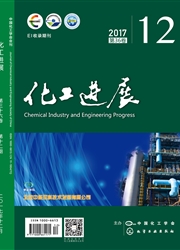

 中文摘要:
中文摘要:
采用浸渍法制备了Pt改性的Pt/SO42/ZrO2-Al2O3(PSZA)催化剂,考察了活化条件对PSZA催化剂正己烷异构化活性的影响,采用程序升温氧化(TPO-MS)、氮气-程序升温处理(TPN-MS)、程序升温还原(TPR-MS)对催化剂进行表征。异构化反应在连续流动的固定床微型反应器中进行。结果表明,200℃以上的高温氮气中活化预处理后的PSZA几乎没有异构化活性;空气气氛中、200~500℃高温条件下活化预处理的PSZA表现出了较高的异构化活性,正己烷初始转化率均在85%以上。在高于300℃的氢气中活化预处理,PSZA表现出较低的异构化活性。空气气氛中预处理除脱水之外,由于氧气的存在对催化剂的表面起到再氧化作用,导致高的异构化活性。氢气气氛中高温活化预处理导致了PSZA上硫物种的损失,进而引起异构化活性的下降。PSZA适宜的预处理条件为:空气气氛、300~500℃活化,250℃氢气中还原。
 英文摘要:
英文摘要:
Pt/SO42-/ZrO2-Al2O3(PSZA) catalyst was prepared by impregnating SO42-/ZrO2-Al2O3with H2PtCl6.The effect of activation condition on n-hexane isomerization activity of PSZA catalyst was investigated.The catalyst was characterized by temperature-programmed oxidation(TPO-MS),temperature-programmed nitrogen treatment(TPN-MS) and temperature-programmed reduction(TPR-MS).The n-hexane isomerization activity of the catalyst was evaluated in a continuous flow fixed bed reactor.The experiment results showed that the conversion of n-hexane over PSZA was about 85% when it was activated in air at the temperature ranging from 200 ℃ to 500 ℃.However,the catalyst hardly possessed the isomerization activity when PSZA was activated in nitrogen at above 300 ℃.The reduction pretreatment at a high temperature above 300 ℃ led to the great decrease in catalytic activity.It was proposed that the role of activation in air at a high temperature was not only removal of water on the catalyst,but also re-oxidation of catalyst surface,which led to high catalytic activity.However,the pre-treatment in hydrogen gas at a high temperature led to the loss of sulfur species over PSZA,resulting in significant decrease in catalytic activity.The suitable activation condition was as follows:pretreatment in air at the temperature ranging from 300 ℃ to 500 ℃ and reduction in hydrogen gas at 250 ℃.
 同期刊论文项目
同期刊论文项目
 同项目期刊论文
同项目期刊论文
 期刊信息
期刊信息
